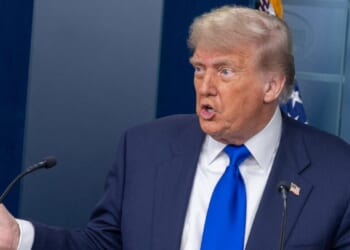As the Israel–Iran conflict heats up and Republicans openly battle over America’s response, a strange quiet has descended over the Democratic Party’s leadership. At first glance, this silence may seem like an attempt to watch their GOP opponents self-implode, but that’s not the only reason they have shied away from the headlines. The Democrats know their coalition is just as fractured, fragile, and combustible as the Republican one — and they’re afraid to light the match.
President Donald Trump cut short his attendance at the G7 Summit in Canada on Monday “because of what’s going on in the Middle East,” according to White House press secretary Karoline Leavitt. Upon returning to the U.S. early Tuesday, Trump made several Truth Social posts warning that Iran cannot, under any circumstance, get a nuclear bomb — but he never explicitly typed out a blatant endorsement of Israel’s strikes on Iran. Instead, Trump said Iran should have signed the “deal” he told them to sign before their 60 days ran out, adding that Iran’s choice would lead to such a “waste of life.”
Importantly, Trump neither ruled out potential U.S. intervention nor dismissed the possibility of engaging with Iran directly if they sought dialogue first.
For days, both mainstream and independent media alike have been gripped by the same question: What will Trump do next?
Republicans at War Over War
But while the nation waits for Trump’s next move, the Republican coalition is at odds regarding how to respond to the Middle East crisis. On one side are traditional hawks — figures like Sen. Lindsey Graham, former CIA director Mike Pompeo, and outspoken radio host Mark Levin — who argue America must stand firm with Israel, supporting military action against Iran without hesitation. Levin in particular has been engaged in a public feud with Tucker Carlson for weeks, derisively calling him “Chatsworth Qatarlson” and accusing the former Fox News star of undermining Trump’s policy and echoing Iranian interests.
Carlson, who leads the faction skeptical of intervention, warns against America becoming entangled in another costly and dangerous foreign war. He has criticized Levin, Sean Hannity, and Rupert Murdoch as reckless warmongers, accusing them of pushing the U.S. toward unnecessary conflict. In an interview with Steve Bannon, Carlson claimed his Fox News show was shut down because he was critical of Ukrainian President Vladimir Zelensky. He said the network was trying to “knock elderly Fox viewers off their feet” by “turning up the propaganda hose” about Iran’s nuclear threat.
This rift has played out loudly on social media platforms like X, with each side questioning the others’ patriotism and judgment. Even Trump lobbed a shot at Carlson in video captured Monday, telling him to “go get a television network and say it so that people listen.”
In contrast, the silence of Democrat front ranks has been deafening.
Democrats Keep Quiet to Avoid a Civil War
Progressives like Sen. Bernie Sanders and Rep. Alexandria Ocasio-Cortez have clearly opposed military escalation. In a bipartisan move, AOC and other Squad Democrats joined forces with Republican Rep. Thomas Massie, a libertarian who put forth legislation that would restrict America’s potential wartime debut on the world stage. But much of the Democrat establishment — including Senate Majority Leader Chuck Schumer, House Minority Leader Hakeem Jeffries, former House Speaker Nancy Pelosi, and failed presidential nominees Hillary Clinton and Kamala Harris — have stayed conspicuously quiet on the issue. Instead, they have been posting on social media about Father’s Day, the “No Kings” protests, and anti-ICE outbursts.
This omission is revealing. The Democrat coalition is deeply divided between an establishment faction firmly supporting Israel and a progressive wing wary of waging more wars. Senators like Arizona’s Mark Kelly and Pennsylvania’s John Fetterman have voiced strong support for Israel, while younger constituents of the party — their pro-Gaza voter base — demand restraint.
For Democrats, the issue of Iran is a political minefield. Any public stance risks alienating a significant part of contradicting coalitions. Their silence is less about strategy and more about fear — after bombing the 2024 election to Trump’s second term, deciding whether or not to drop one on Iran could further inflame internal divisions and jeopardize their fragile electoral prospects.
Republicans Must Lead — But at What Political Cost?
This leaves Republicans alone on the battlefield — not just in foreign policy, but in the domestic political theater surrounding it. Unlike Democrats, they don’t have the luxury of silence. Trump is president again. The GOP controls the White House and is setting the tone for America’s response on the world stage. That comes with a cost: the infighting, the media pressure, the ideological rifts all laid bare.
Republicans have to hash this out in the open because the world is watching — and because right now, they’re the party in power. Every move, every tweet, and every televised spat carries real-world consequences. The Democrats, at least for now, can afford to stay quiet and let the GOP wear the burden of leadership. But if this crisis escalates further, their silence won’t shield them forever. At some point, everyone will have to choose a side — and say it out loud.
Julianna Frieman is a writer based in North Carolina. She got her bachelor’s degree in Political Science from the University of North Carolina at Charlotte. She is pursuing her master’s degree in Communications (Digital Strategy) at the University of Florida. Her work has been published by the Daily Caller, The American Spectator, and The Federalist. Follow her on X at @juliannafrieman.


![Former Bravo Star Charged After Violent Assault Using a Rock-Filled Sock in Tennessee Walmart [WATCH]](https://www.right2024.com/wp-content/uploads/2025/07/Former-Bravo-Star-Charged-After-Violent-Assault-Using-a-Rock-Filled-350x250.jpg)



![Karoline Leavitt Levels CNN's Kaitlan Collins and Other Legacy Media Reporters [WATCH]](https://www.right2024.com/wp-content/uploads/2025/07/Karoline-Leavitt-Levels-CNNs-Kaitlan-Collins-and-Other-Legacy-Media-350x250.jpg)
![Man Arrested After Screaming at Senators During Big Beautiful Bill Debate [WATCH]](https://www.right2024.com/wp-content/uploads/2025/06/Man-Arrested-After-Screaming-at-Senators-During-Big-Beautiful-Bill-350x250.jpg)


![Illegal Alien Walked Free After Decapitating Woman, Abusing Corpse for Weeks [WATCH]](https://www.right2024.com/wp-content/uploads/2025/07/1753013138_Illegal-Alien-Walked-Free-After-Decapitating-Woman-Abusing-Corpse-for-350x250.jpg)





